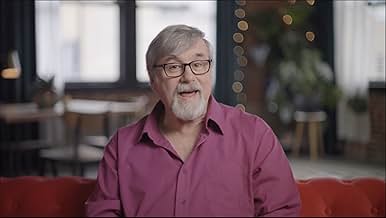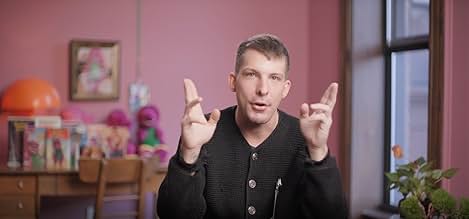Follow Barney the Dinosaur's furious reaction and what he says about the human need to hate. Something in American society was broken and never came back, or is it just who we were all along... Read allFollow Barney the Dinosaur's furious reaction and what he says about the human need to hate. Something in American society was broken and never came back, or is it just who we were all along?Follow Barney the Dinosaur's furious reaction and what he says about the human need to hate. Something in American society was broken and never came back, or is it just who we were all along?
Browse episodes
Featured reviews
I used to like Barney when I was younger, but I'm now neutral to it. However, I agree or used to agree with some of the criticisms it commonly receives and used to make fun of some of them (e.g., Barney's voice sounding dopey, some of the songs being annoying, the series being set in a perfect world, etc. I still hate these aspects, minus the setting being "perfect"). I'm also aware that there's a Wikipedia page for anti-Barney humor. I decided to watch I Love You, You Hate Me because I was intrigued when I read about it in an article and saw the trailer, and I have to admit that it was a good documentary! There are people from media that I like who are involved in this, like Steve Burns from Blue's Clues, Bill Nye the Science Guy, and a few others. I was already neutral to Barney before watching the doc, but I've warmed up to Barney a little more because of it.
After learning more about Barney from the doc, it's clear that some people take the popular children's character too seriously. Barney the purple dinosaur is known for loving and accepting everyone for who they are, and I don't understand how anyone could go wrong with that. Friendship and acceptance are essential themes of the show. A couple of the child (now adult) actors from the first three seasons of Barney shared experiences of racism before it came along, and they found acceptance and appreciation during their time on the show. However, after leaving the show and going back to school, they faced bullying from their peers for their involvement with Barney and struggled with coping mechanisms such as smoking and drinking. It's heartwarming that they found acceptance on the show, but it's sad to hear about the challenges they faced before and afterward.
Unfortunately, there have been instances of bullying and mistreatment directed at Barney's fans and the show's cast and crew, including death threats via emails and name-calling. It's disheartening to hear that some individuals have targeted Barney fans and the show's personnel with harassment, threats, and destructive behavior. This behavior does not align with Barney's core values, which include love, inclusion, and acceptance. It's important to remember that everyone is entitled to their own opinions, and it's okay if someone doesn't like Barney. However, it's essential to treat others with respect and consideration and to acknowledge the positive impact the show has had on many individuals, regardless of differing preferences.
The documentary also talks about the negative reception Barney received when it first aired in the 1990s. Some people criticized the show for not being edgy, reflecting a cultural tendency toward cynicism at the time. It's noted that the rise of the internet during that era also contributed to the backlash the show faced. It's worth remembering that just because something isn't considered edgy doesn't mean it sucks. If every show/movie were edgy, the TV/movie industry would be boring and unoriginal. If people had given Barney a chance, they might have liked it.
The text also draws a parallel between the criticism faced by Barney and what Sesame Street might have experienced if the internet existed during its early years. It's acknowledged that some people might not like Barney, and that's okay.
Barney's head writer, Steve White, emphasized that the show aimed to inspire viewers to make the world a better place and never tried to argue that the world was a perfect place. There are several episodes where the characters face challenges and conflicts, even ones from before the Hit Entertainment era (more about that in a little bit), such as Baby Bop getting a stomachache after eating too many cookies, the kids getting scared of a grizzly bear, the characters losing a Christmas star, Barney and the kids trying to help BJ and Baby Bop settle an argument, and more. Additionally, Hit Entertainment created more episodes with conflict-based plots in response to feedback about the show's setting when they acquired the rights to it. The characters are indeed happy most of the time, but why shouldn't they be? What do you expect them to do? Mope around like a bunch of goths? Also, these items made me realize that the criticisms about the perfect setting were somewhat invalid. Despite differing opinions, many people appreciate the valuable life lessons imparted by Barney, even if they don't particularly enjoy the show itself.
Steve Burns asked the rest of the crew, "Who was your Barney growing up, and how would you feel about a room full of people hating on him/her?" Their "Barneys" included their teddy bears, Elmo, Bert and Ernie, Big Bird, and numerous other characters and toys, and they didn't like the idea of a room full of people hating on them. I must say that they hit the nail on the head with those lines! Even though I grew up with Barney, I think it'd be more accurate to say that my "Barney" was either Charlie Brown, Winnie the Pooh, Mickey Mouse, SpongeBob, Elmo, or all of the above, and I REALLY wouldn't want to be in a room full of people hating on either of them. You probably wouldn't like the idea of a room full of people bashing your favorite toy(s) or character(s) either.
In conclusion, whether you love or hate Barney, "I Love You, You Hate Me" offers a fresh perspective that may change your feelings about the character and show. Even if you're a Barney fan, this documentary is worth watching to gain a deeper understanding of the public's perception.
After learning more about Barney from the doc, it's clear that some people take the popular children's character too seriously. Barney the purple dinosaur is known for loving and accepting everyone for who they are, and I don't understand how anyone could go wrong with that. Friendship and acceptance are essential themes of the show. A couple of the child (now adult) actors from the first three seasons of Barney shared experiences of racism before it came along, and they found acceptance and appreciation during their time on the show. However, after leaving the show and going back to school, they faced bullying from their peers for their involvement with Barney and struggled with coping mechanisms such as smoking and drinking. It's heartwarming that they found acceptance on the show, but it's sad to hear about the challenges they faced before and afterward.
Unfortunately, there have been instances of bullying and mistreatment directed at Barney's fans and the show's cast and crew, including death threats via emails and name-calling. It's disheartening to hear that some individuals have targeted Barney fans and the show's personnel with harassment, threats, and destructive behavior. This behavior does not align with Barney's core values, which include love, inclusion, and acceptance. It's important to remember that everyone is entitled to their own opinions, and it's okay if someone doesn't like Barney. However, it's essential to treat others with respect and consideration and to acknowledge the positive impact the show has had on many individuals, regardless of differing preferences.
The documentary also talks about the negative reception Barney received when it first aired in the 1990s. Some people criticized the show for not being edgy, reflecting a cultural tendency toward cynicism at the time. It's noted that the rise of the internet during that era also contributed to the backlash the show faced. It's worth remembering that just because something isn't considered edgy doesn't mean it sucks. If every show/movie were edgy, the TV/movie industry would be boring and unoriginal. If people had given Barney a chance, they might have liked it.
The text also draws a parallel between the criticism faced by Barney and what Sesame Street might have experienced if the internet existed during its early years. It's acknowledged that some people might not like Barney, and that's okay.
Barney's head writer, Steve White, emphasized that the show aimed to inspire viewers to make the world a better place and never tried to argue that the world was a perfect place. There are several episodes where the characters face challenges and conflicts, even ones from before the Hit Entertainment era (more about that in a little bit), such as Baby Bop getting a stomachache after eating too many cookies, the kids getting scared of a grizzly bear, the characters losing a Christmas star, Barney and the kids trying to help BJ and Baby Bop settle an argument, and more. Additionally, Hit Entertainment created more episodes with conflict-based plots in response to feedback about the show's setting when they acquired the rights to it. The characters are indeed happy most of the time, but why shouldn't they be? What do you expect them to do? Mope around like a bunch of goths? Also, these items made me realize that the criticisms about the perfect setting were somewhat invalid. Despite differing opinions, many people appreciate the valuable life lessons imparted by Barney, even if they don't particularly enjoy the show itself.
Steve Burns asked the rest of the crew, "Who was your Barney growing up, and how would you feel about a room full of people hating on him/her?" Their "Barneys" included their teddy bears, Elmo, Bert and Ernie, Big Bird, and numerous other characters and toys, and they didn't like the idea of a room full of people hating on them. I must say that they hit the nail on the head with those lines! Even though I grew up with Barney, I think it'd be more accurate to say that my "Barney" was either Charlie Brown, Winnie the Pooh, Mickey Mouse, SpongeBob, Elmo, or all of the above, and I REALLY wouldn't want to be in a room full of people hating on either of them. You probably wouldn't like the idea of a room full of people bashing your favorite toy(s) or character(s) either.
In conclusion, whether you love or hate Barney, "I Love You, You Hate Me" offers a fresh perspective that may change your feelings about the character and show. Even if you're a Barney fan, this documentary is worth watching to gain a deeper understanding of the public's perception.
I admit, for about 20 years I was a Barney "hater". The toxic discourse around the beloved children's character in the 1990s and 2000s was waiting for me when I grew out of the franchise ... and from there I believed many mistruths that left indelible stains on an otherwise golden legacy of entertaining and educating children worldwide.
I eventually grew out of my misdirected disrespect and I wondered why Barney was such a viscerally hated character. There were no definitive answers ... until this documentary dropped on Peacock.
The documentary does a valiant job entertaining some of the reasons why Barney endured some of the most intense wrath hurled from all corners of society - from toxic masculinity to some of the haters' own self-hatred. Unfortunately, the 60-minute two-episode format doesn't lend itself well to the material. A lot of valuable information is either truncated or left out. Some 45 interviews were conducted for the documentary and key people associated with the franchise had to be cut. With a longer series, some interesting perspectives could have been explored in more intricate detail.
However, there are some gems in the docuseries - lots of never-before-seen behind the scenes footage is a delight to witness for fans and people who are Barney-curious. Some of the cast and crew give a good insight into the production and we get to hear some interesting stories.
All in all, worth a watch, but be prepared to feel some frustration at some questions that are still left unanswered at the conclusion of Part 2.
I eventually grew out of my misdirected disrespect and I wondered why Barney was such a viscerally hated character. There were no definitive answers ... until this documentary dropped on Peacock.
The documentary does a valiant job entertaining some of the reasons why Barney endured some of the most intense wrath hurled from all corners of society - from toxic masculinity to some of the haters' own self-hatred. Unfortunately, the 60-minute two-episode format doesn't lend itself well to the material. A lot of valuable information is either truncated or left out. Some 45 interviews were conducted for the documentary and key people associated with the franchise had to be cut. With a longer series, some interesting perspectives could have been explored in more intricate detail.
However, there are some gems in the docuseries - lots of never-before-seen behind the scenes footage is a delight to witness for fans and people who are Barney-curious. Some of the cast and crew give a good insight into the production and we get to hear some interesting stories.
All in all, worth a watch, but be prepared to feel some frustration at some questions that are still left unanswered at the conclusion of Part 2.
This two part documentary dives deep into the history - and the controversy- around Barney the dinosaur. It's touching, it shocking, it's at times hard to watch. From recognizable faces to voices that immediately ignite nostalgia, I loved seeing so many of the cast, crew, and other thought leaders weigh in on the history and cultural impact of Barney. This doc exposes the hate surrounding the character, and what it says about our society and culture as a whole. Why do we love to hate? What about Barney was so threatening to so many? What can we do to make our world more like Barney's world? More importantly - when we will see Barney return to TV?
This documentary goes to show just how far mankind has sunk. Barney was created as a tool for love by a mom who loved her son, and a large portion of the world reacts with hatred. The sad part is that they don't see anything wrong with that. As a kid, I loved watching Barney on TV. I had a plush Barney, but that was it. I only watched the show on PBS, which kept the rest of the house sane by not replaying a tape. I think that some in the documentary took their love of Barney too far. You'll know them when you watch. Also, I think Leach should've walked away much sooner to save her family. As much as modern women like to think we can do it all, we just can't. Very sad!
Having grown up watching and loving Barney, I was completely unaware of the negative reactions. I was also unaware of the group that hated Barney. Great video with interviews and the cast. Recommend it, highly. I think this is something that should be watched by anyone who knows Barney, no matter how they feel about him. Seeing both sides really opened my eyes and deepened my love for Barney at the same time. I only wish that this had been made sooner. It was interesting (and sad) to see what happened to the family that created Barney. Nonetheless, this is a documentary I'll be watching again quite a few times.
Did you know
- ConnectionsFeatured in AniMat's Crazy Cartoon Cast: My Father's Purple Dragon (2022)
Details
- Release date
- Country of origin
- Language
- Also known as
- Barney the Dinosaur Documentary
- Production companies
- See more company credits at IMDbPro
- Color
Contribute to this page
Suggest an edit or add missing content




























